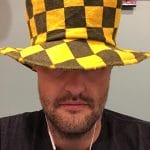2020/Online/collections
This article is a stub. You can help the IndieWeb wiki by expanding it.
Collections and You was a session at IndieWebCamp Online 2020.
Notes archived from https://etherpad.indieweb.org/collections.
IndieWebCamp Online 2020
Session: Collections and You
When: 2020-02-08 19:00 UTC
Participants
- Maxwell Joslyn (facilitator)
David Shanske
 tw2113
tw2113 Greg McVerry
Greg McVerry Chris Aldrich
Chris Aldrich- Melanie E Magdalena
- Aaron Klemm
 Scott Gruber
Scott Gruber- Jack Jamieson
Notes
The collection in one sentence: a post that links to, or embeds, multiple other posts
- similar to a feed, but a feed is almost always chronological (oldest-first or newest-first), while a collection might express authorial intent through some other ordering of collected posts
Examples
- a subset of content published in another feed: suppose you have a photos feed, but you make a photo album post collecting only your photos from your 2019 trip to Vienna
- this day: suppose on February 8th, 2020, you publish a post called "this day in the past" where you link to all the posts you've made on February 8th in previous years
Usage in the Wild
 Chris Aldrich has collections on his site: for instance, this index of his IndieWeb-related posts
Chris Aldrich has collections on his site: for instance, this index of his IndieWeb-related posts
- serves to centralize information on how his site functions
- some are time-based, some are steps in procedures
- Chris: "order was imposed after the fact [because] it may be easier for others to perform steps or [use information] in a different order"
 Greg McVerry posts photo collections on his site, such as [https://jgregorymcverry.com/iwcnyc2019 this one from 2019/NYC
Greg McVerry posts photo collections on his site, such as [https://jgregorymcverry.com/iwcnyc2019 this one from 2019/NYC
- each collection is an h-entry, with each embedded image being its own h-entry
- each collection of photos on this page is an h-entry, with nested h-entries, each their own image
Maxwell Joslyn has a poems index which he plans to convert into a collection by giving each poem its own permalink
- poems are ordered non-chronologically; if he turns his poetry page into a feed, he would like that order to be respected in indie readers
Consuming Collections
How should collections be displayed when consumed by feed readers? Chronologically? What if that destroys part of the 'essence' of the collection?
Collections as Aggregations
- categories for different languages: if you syndicate to e.g. the English endpoint, the site will pull your post into a collection/feed of English-language news posts
- similar aggregation function as news.indieweb.org, but organized in a tag taxonomy instead
Services like these may represent the IndieWeb version of news aggregators like Reddit and Hacker News.
Music and Podcasts
 Chris Aldrich wants to turn his LastFM/Spotify playlists into a collection. He feels what's missing from online music is the ability to export playlists. "How can I own that playlist as a collection on my own website, and plug that into a service like Spotify, so I can ... carry it around with me?"
Chris Aldrich wants to turn his LastFM/Spotify playlists into a collection. He feels what's missing from online music is the ability to export playlists. "How can I own that playlist as a collection on my own website, and plug that into a service like Spotify, so I can ... carry it around with me?"
Tangential: imagine a music-provider-agnostic service where you paste in song name + artist, and the service finds you that music across all platforms (YouTube, Spotify, LastFM, etc.) with which the service is integrated. Individual music platforms have no incentive to provide this.
There's an open standard for podcasts called OPML, including something called OPML Subscribe: Inoreader (any others?) can parse a collection of OPML-enabled podcast feeds and subscribe to those
 Chris Aldrich has a podcast follow page where he maintains a list of the podcasts he is listening to; people can subscribe to that page to keep in sync with what he recommends
Chris Aldrich has a podcast follow page where he maintains a list of the podcasts he is listening to; people can subscribe to that page to keep in sync with what he recommends- listen posts provide a more valuable indicator, a stronger endorsement of the thing being played, than merely "this is something I like"
Book/library pages are strong candidates for collections.  Scott Gruber would like to use such a page to understand changes in his reading habits over time.
Scott Gruber would like to use such a page to understand changes in his reading habits over time.
See Also
- 2020/Online/Schedule
- collection
- Muxtape, by Kicks Condor, for online, IndieWeb-compatible playlists
- Share your OPML: http://dev.opml.org/share/
- RFC 5005, a standard which defines types of feeds which might be paginated, archival, or marked "complete"
